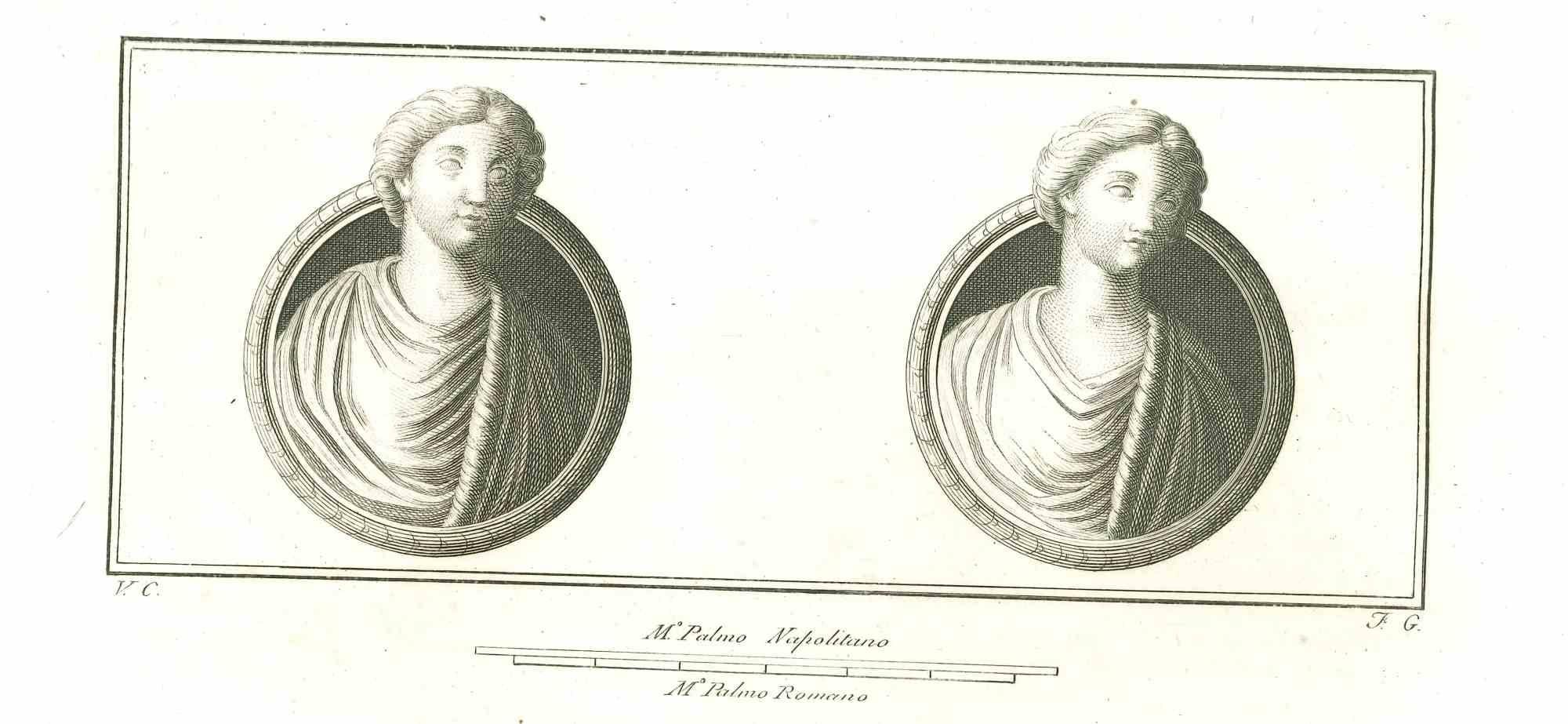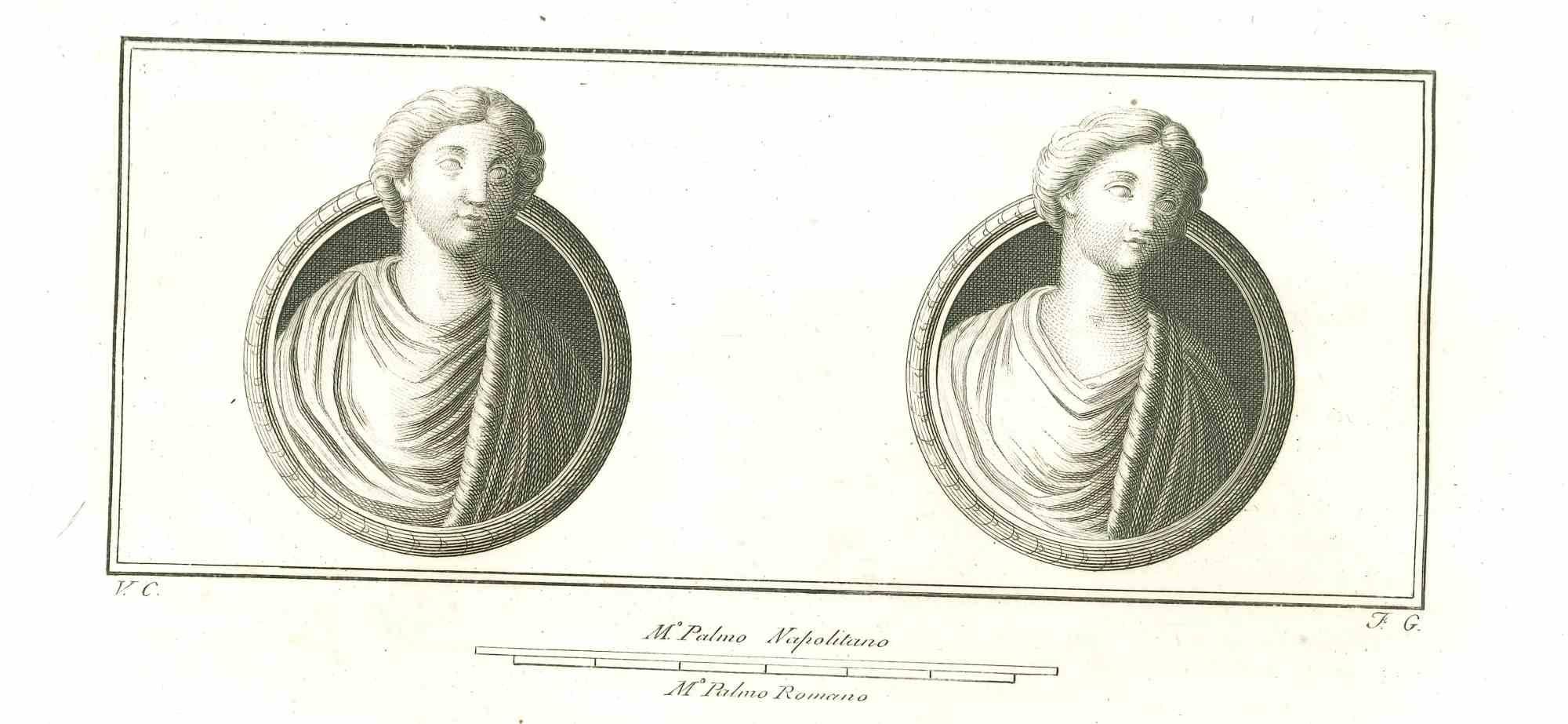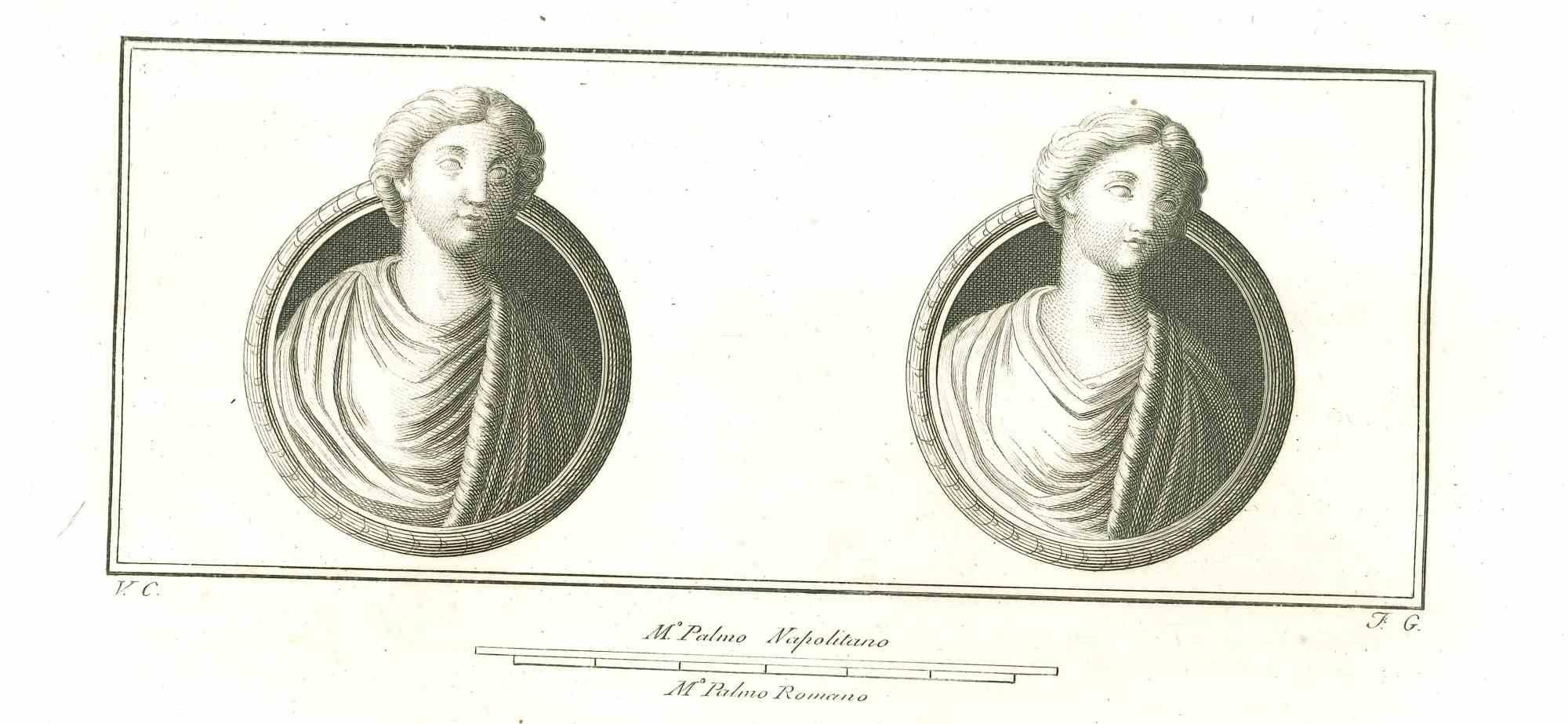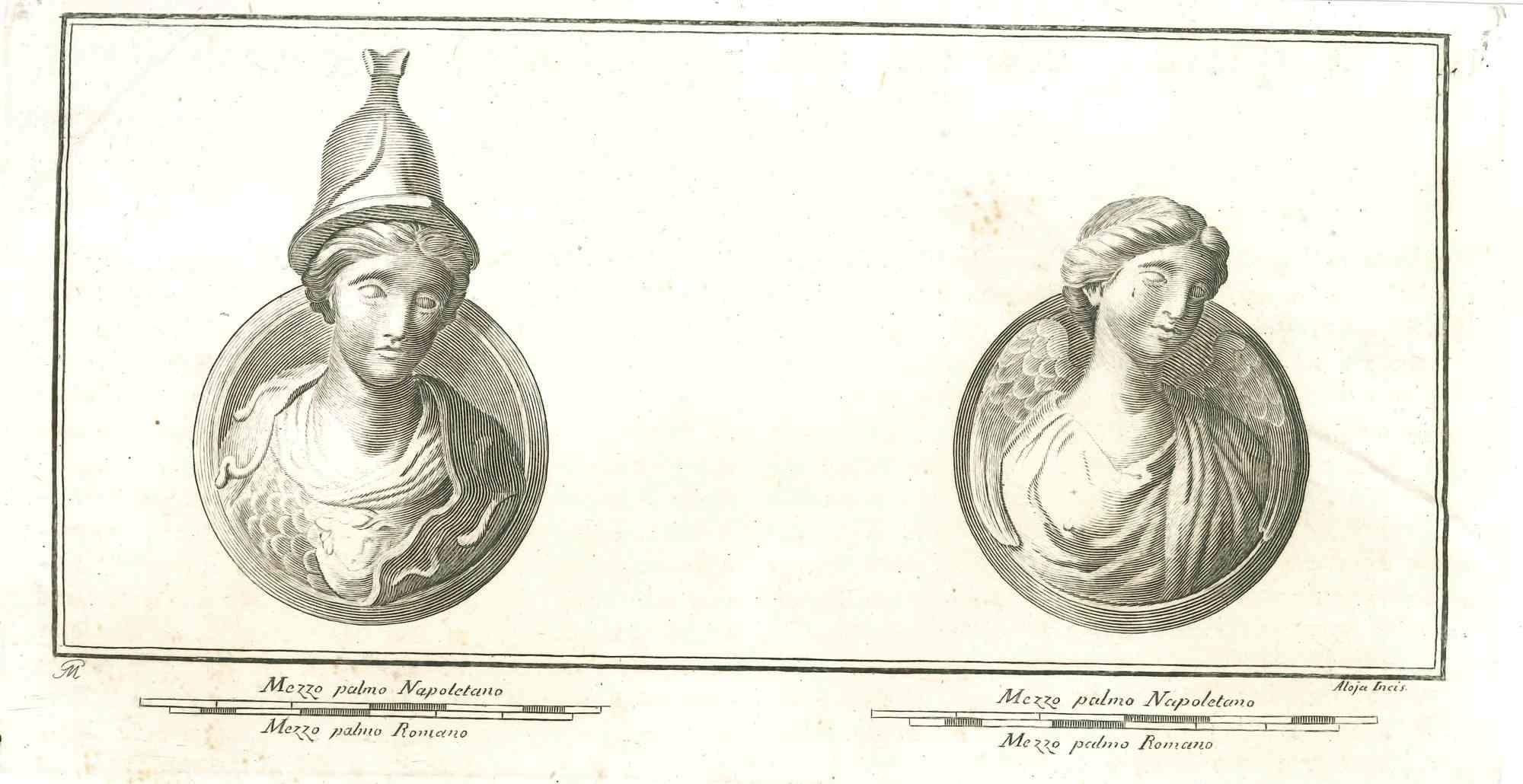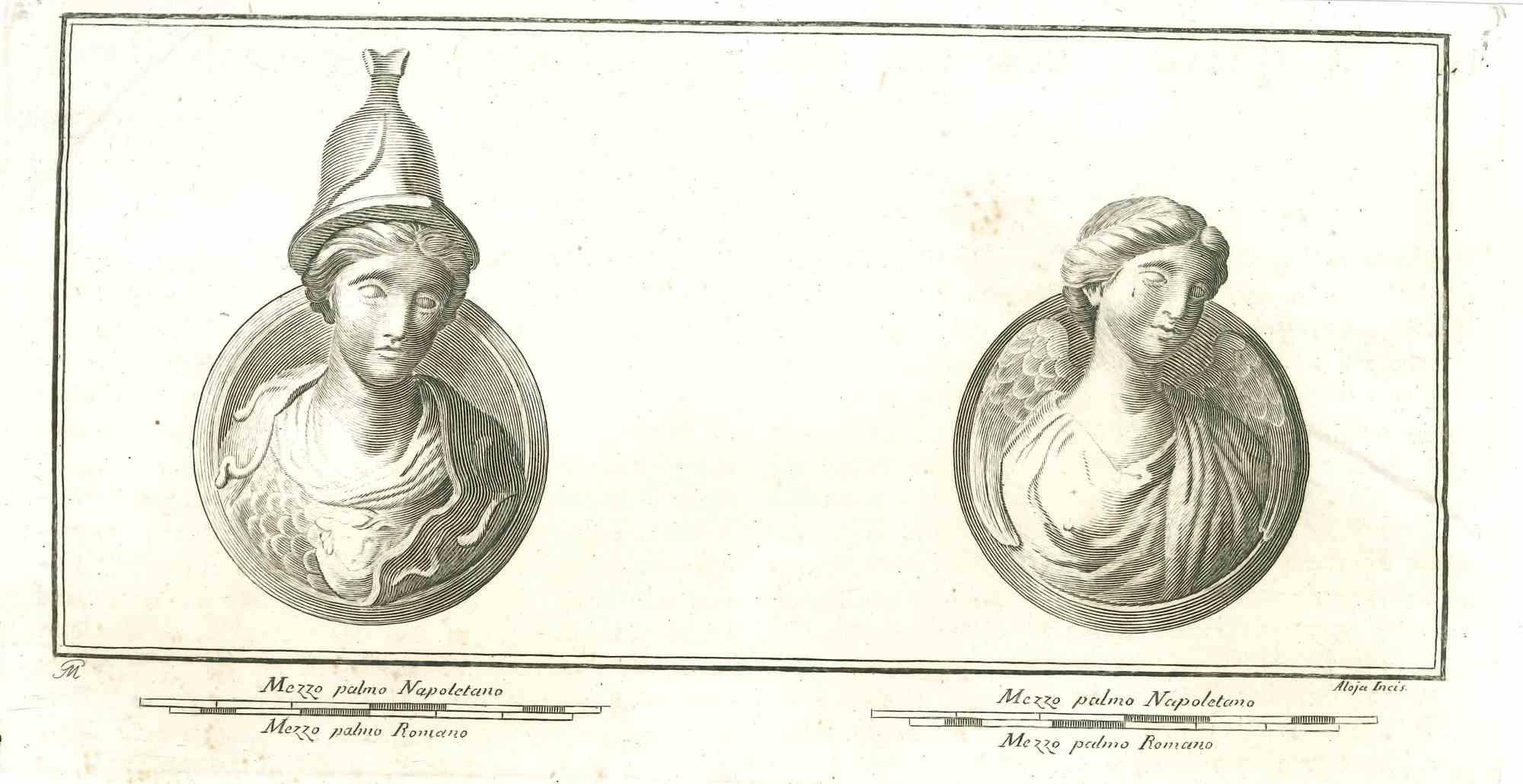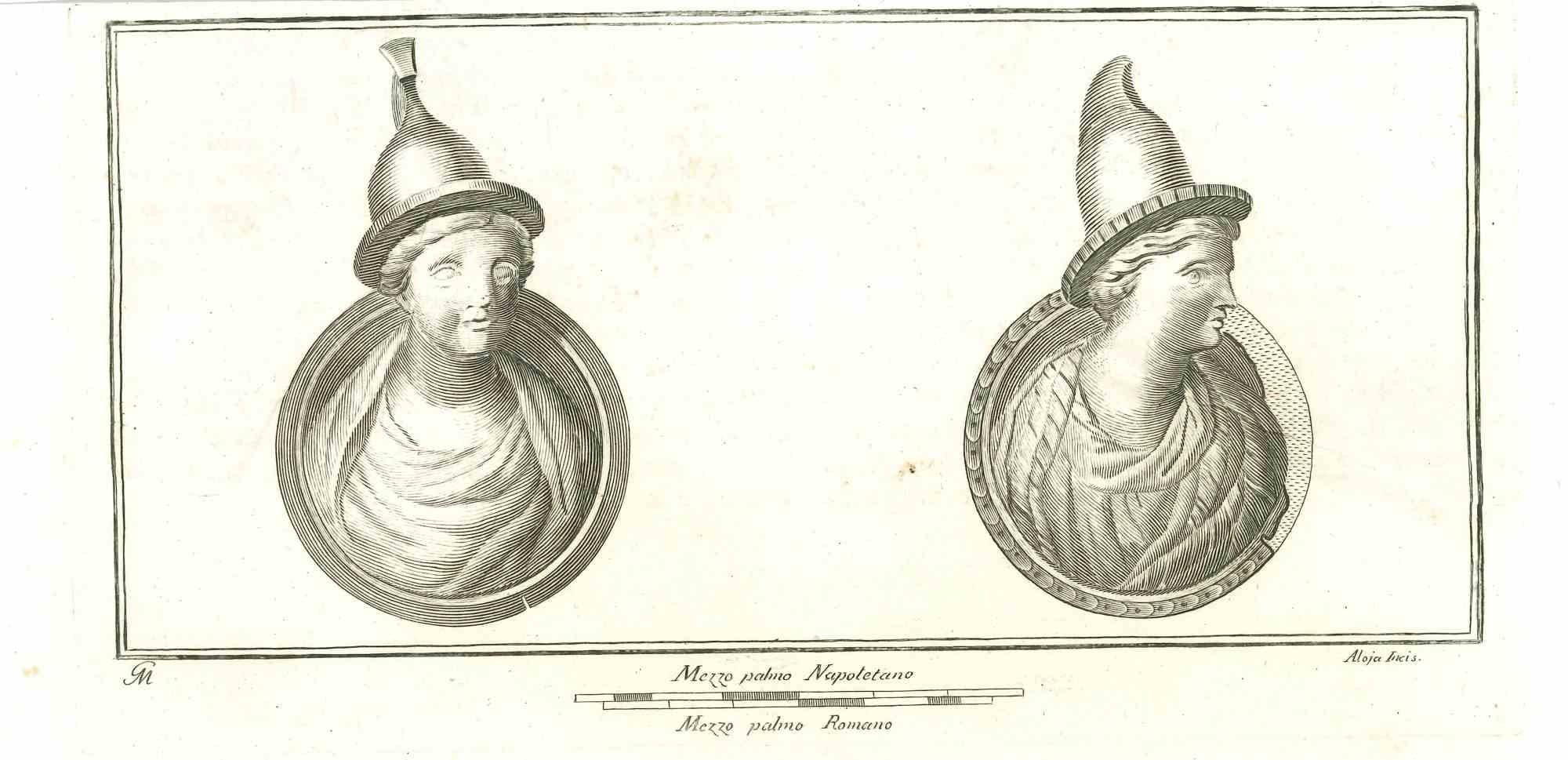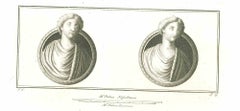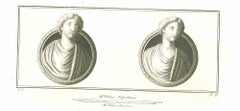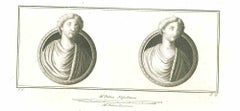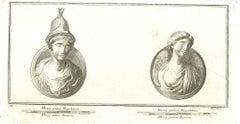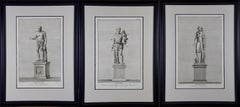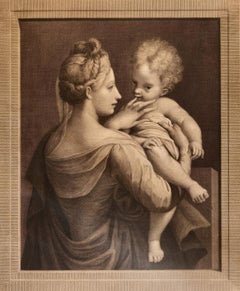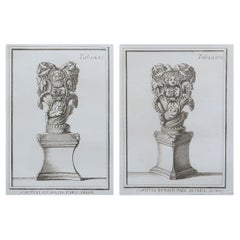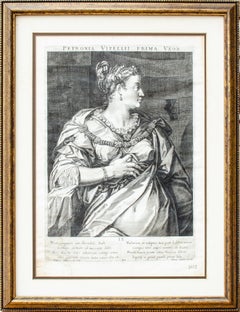Items Similar to Ancient Roman Relief - Original Etching by Vincenzo Campana - 18th Century
Want more images or videos?
Request additional images or videos from the seller
1 of 2
Vincenzo CampanaAncient Roman Relief - Original Etching by Vincenzo Campana - 18th CenturyLate 18th Century
Late 18th Century
$235.39
£179.82
€200
CA$331.68
A$365.21
CHF 189.38
MX$4,325.08
NOK 2,404.02
SEK 2,246.83
DKK 1,523.64
About the Item
Ancient Roman Relief, from the series "Antiquities of Herculaneum", is an original etching on paper realized by Vincenzo Campana in the 18th century.
Signed on the plate on the lower left.
Good conditions but aged.
The etching belongs to the print suite “Antiquities of Herculaneum Exposed” (original title: “Le Antichità di Ercolano Esposte”), an eight-volume volume of engravings of the finds from the excavation of the ruins of Herculaneum in the Kingdom of Naples (now Campania, Italy).
It was published between 1757 and 1792 by the Regia Stamperia, and copies were delivered to selected recipients across Europe.
Despite the title, the Antiquity of Herculaneum shows objects from all the excavations undertaken by the Bourbons in the Gulf of Naples. These include Pompeii, Stabia and two sites of Herculaneum: Resina and Portici.
The Bourbon King Carlo appointed fifteen scholars creating a new “Herculaneum Academy” to study the artifacts and publish the results of the archaeological excavations of the sites.
The engravings are of high quality and the accompanying text shows a large scholarship.
They were realized by 25 prominent artists involved by the King to prepare drawings and engravings on the finds, among which we can find Giovanni Elia Morghen, Carlo Nolli, Luigi Vanvitelli and Giovanni Battista Casanova.
The “Antiquities” was designed more to amaze readers with the quality of the objects in the collection of the King of Naples than to be used in research., following and increasing the interest of 18th century society for the classical culture and Art in particular.
Through the exaltation of the classical concept of proportions and harmony, the book was of inspiration to the neoclassical movement in Europe, giving artists and decorators access to a huge shop of Hellenistic motifs.
Ref.:
National Gallery (Washington), Mark J. Millard Architectural, IV (2000), no. 1;
L. Garcia y Garcia, Nova bibliotheca pompeiana (2 v., 1998);
Royal Institute of British Architects, British Architectural Library ... Early printed books, 1 (1994), no. 112.
U. Pannuti, 'Incisori e disegnatori della Stamperia Reale di Napoli nel secolo XVIII: la pubblicazione delle Antichità di Ercolano', in Xenia antiqua, 9 (2000), p. 151-178;
V. Trombetta, 'L'edizione de Le Antichità di Ercolano esposte' in Rendiconti dell'Accademia di Archeologia, lettere e belle arti di Napoli , 59 (1984), p.151-172.
- Creator:
- Creation Year:Late 18th Century
- Dimensions:Height: 4.53 in (11.5 cm)Width: 9.85 in (25 cm)Depth: 0.08 in (2 mm)
- Medium:
- Movement & Style:
- Period:
- Framing:Framing Options Available
- Condition:Insurance may be requested by customers as additional service, contact us for more information.
- Gallery Location:Roma, IT
- Reference Number:Seller: T-1263721stDibs: LU65039370692
About the Seller
4.9
Platinum Seller
Premium sellers with a 4.7+ rating and 24-hour response times
1stDibs seller since 2017
7,816 sales on 1stDibs
Typical response time: 1 hour
- ShippingRetrieving quote...Shipping from: Monaco, Monaco
- Return Policy
More From This Seller
View AllAncient Roman Relief - Original Etching by Vincenzo Campana - 18th Century
By Vincenzo Campana
Located in Roma, IT
Ancient Roman Relief, from the series "Antiquities of Herculaneum", is an original etching on paper realized by Vincenzo Campana in the 18th century.
Signed on the plate on the lower...
Category
Late 18th Century Old Masters Figurative Prints
Materials
Etching
Ancient Roman Relief - Original Etching by Vincenzo Campana - 18th Century
By Vincenzo Campana
Located in Roma, IT
Ancient Roman Relief, from the series "Antiquities of Herculaneum", is an original etching on paper realized by Vincenzo Campana in the 18th century.
Signed on the plate on the lower...
Category
Late 18th Century Old Masters Figurative Prints
Materials
Etching
Ancient Roman Relief - Original Etching by Vincenzo Campana - 18th Century
By Vincenzo Campana
Located in Roma, IT
Ancient Roman Relief, from the series "Antiquities of Herculaneum", is an original etching on paper realized by Vincenzo Campana in the 18th century.
Signed on the plate on the lower...
Category
Late 18th Century Old Masters Figurative Prints
Materials
Etching
Ancient Roman Relief - Original Etching by Vincenzo Campana - 18th Century
By Vincenzo Campana
Located in Roma, IT
Ancient Roman Relief, from the series "Antiquities of Herculaneum", is an original etching on paper realized by Vincenzo Campana in the 18th century.
Signed on the plate on the lower...
Category
Late 18th Century Old Masters Figurative Prints
Materials
Etching
Ancient Roman Relief - Original Etching by Vincenzo Aloja - 18th Century
Located in Roma, IT
Ancient Roman Relief, from the series "Antiquities of Herculaneum", is an original etching on paper realized by Vincenzo Aloja in the 18th Century.
Signed on the plate on the lower r...
Category
Late 18th Century Old Masters Figurative Prints
Materials
Etching
Ancient Roman Relief - Original Etching by Vincenzo Campana - 18th Century
By Vincenzo Campana
Located in Roma, IT
Ancient Roman Relief, from the series "Antiquities of Herculaneum", is an original etching on paper realized by Vincenzo Aloja in the 18th century.
Signed on the plate on the lower r...
Category
Late 18th Century Old Masters Figurative Prints
Materials
Etching
You May Also Like
Ancient Roman Statues in the Vatican: A Grouping of Three 18th C. Engravings
By Vincenzo Dolcibene
Located in Alamo, CA
This is a set of three framed 18th century engravings depicting statues found in the Vatican, including: "Pescatore" (Fisherman), "Pastore" (Shepherd) and "Istrione" (Actor), "Gia ne...
Category
1780s Old Masters Still-life Prints
Materials
Engraving
Parmigiani Amica: An 18th Century Engraving and Etching by Strange After Mazzola
Located in Alamo, CA
This is an 18th century engraving and etching entitled "Parmigiani Amica" by Robert Strange after a painting by Girolamo Francesco Maria Mazzola, better known as Parmigianino, who lived during the Renaissance period. It was published in London in 1774. As the inscription states, the painting was in the collection of the King of Naples at the time the engraving was made. The engraving depicts a half-length portrait of a young woman, known as Parmigiani's Amica (meaning "female friend" in Italian). She is depicted wearing a simple but elegant dress with a low-cut neckline, which reveals her delicate features and graceful neck. Her hair is arranged in a simple yet stylish manner. She is turning to the right to look lovingly at her infant, which she is holding with her right arm. She is touching the baby's mouth with her left hand. The background of the engraving is plain and unadorned, allowing the viewer to focus entirely on the subject of the portrait. The result is a beautiful and timeless image that captures the essence of Renaissance portraiture.
The engraving is printed on watermarked paper. The sheet measures 16.25" high and 12' wide. The sheet is adhered to paper in its upper corners and it has been removed from the paper in its lower corners. There is some mild discoloration and some wrinkling in the margins, including the lower inscription area, and a small dark spot in the upper margin, which may represent a drop of ink occuring at the time of printing. These issues do not involve the image, which is in very good condition. The print is held by several museums and institutions, including: The Metropolitan Museum of Art in New York, The British Museum in London, The Royal Museums of the UK, The British National Trust...
Category
Late 18th Century Portrait Prints
Materials
Engraving, Etching
$1,500 Sale Price
20% Off
Large Scale Original Antique Grand Tour Prints-Relief Carvings. Rome, 1776
Located in St Annes, Lancashire
Wonderful images of Relief Carvings
Copper-plate engravings
Published by Monaldini, Rome, 1776
Good quality wove paper
Free shipping
Category
Antique 1770s Italian Classical Roman Prints
Materials
Plaster
Aegidius Sadeler II Engraving "Petronia, First Wife of Vitellius, Roman Emperor"
By Aegidius Sadeler II
Located in New York, NY
Artist: Aegidius Sadeler II
Petronia, First Wife of Vitellius, from set of Roman Emperors and Empresses, c. 16th-17th century
Engraving
Publisher: Marcus Christoph Sadeler
Sight: 15 1/4 x 10 3/4 in.
Framed: 19 3/4 x 15 1/4 x 1 in.
This image was conceived in the 16th century by Aegidius Sadeler II and published by Marcus Christoph Sadeler. It is unclear when the present version was executed.
Aegidius Sadeler or Aegidius Sadeler II[1] (1570–1629) was a Flemish engraver who was principally active at the Prague court of Rudolf II, Holy Roman Emperor and his successors. Sadeler was born in Antwerp in the Sadeler family of print dealers and engravers. He was the son of Emmanuel de Sayeleer and the nephew of Aegidius I, Jan I en Raphael Sadeler.[2] He was trained by his uncle Jan I and became a member of the Antwerp Guild of St. Luke in 1589. He was active in Munich the next year in 1590, in Rome in 1593, in Naples and then again in Munich in 1594–1597. From 1597 he settled in Prague where he became court engraver for Rudolf II and made engraved portraits of notables and engravings after artworks there, most notably paintings by Bartholomeus Spranger, Roelant Savery, Hans von Aachen, Giuseppe Arcimboldo, and sculptures by Giambologna and Adriaen de Vries.
His early engravings were mostly faithful copies of works by Albrecht Dürer in the Imperial collection and copies of paintings by notable Italian painters such as Raphael, Tintoretto, Parmigianino, Barocci and Titian or by Northern painters who worked there, such as Paul Bril and Denys Calvaert. In Prague he also engraved portraits of the notables of Rudolf's court, and collaborated with Spranger, Joseph Heintz the Elder, Jacobus Typotius and his friend Anselmus Boece de Boodt (1550-1632), Rudolf II's gemologist and physician.[3]
After Rudolf II died he enjoyed the favour and protection of the two succeeding Emperors, Matthias and Ferdinand II.[4][5] According to Michael Bryan...
Category
16th Century Old Masters Portrait Prints
Materials
Engraving
Italian Neo-Classic Engravings of Roman Themes
Located in Queens, NY
5 Italian (19th Cent) Neo-classic engravings depicting Roman statuary/mythological themes framed in silverleaf moulding with matting (PRICED EACH)
Category
Antique 19th Century Italian Neoclassical Paintings
Materials
Silver
Large Scale Original Antique Prints of Renaissance Busts. Rome 1776
Located in St Annes, Lancashire
Wonderful images of renaissance busts
Copper-plate engravings
Published by Monaldini, Rome, 1776
Good quality wove paper
Free shipping
Category
Antique 1770s Italian Renaissance Prints
Materials
Plaster
More Ways To Browse
Contortionist Vintage
Cowboy Bucking Horse
Cubism 1970
Denys Puech
Dior Casablanca
Dodo Print
Dog Dutch Painting
Drawing Of Owl
Eduardo Benito
English Huntsman Original Oil Painting
English Setter Art
Erte Dancer
Exile On Main Street
George Bishop
George Kilburne Goodwin
Golf Course Prints
Gordon Gilkey
Graham Smith
